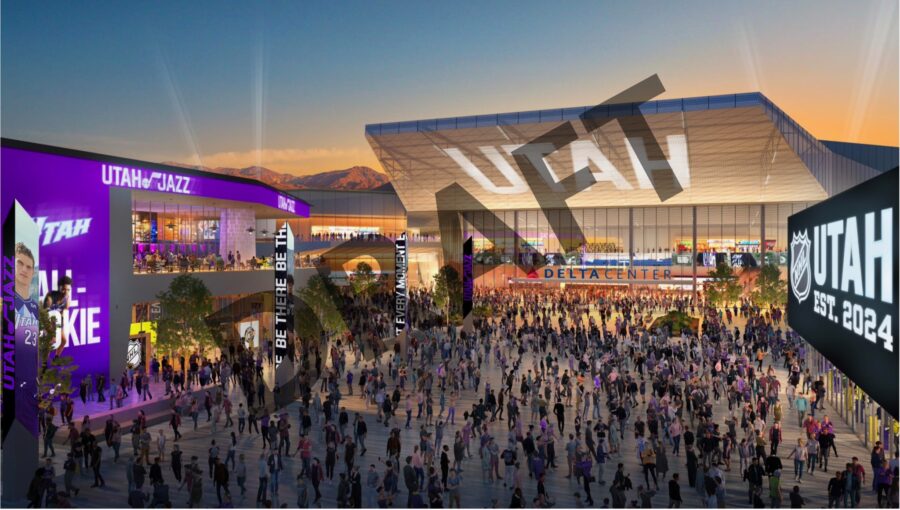Entertainment
SEG downtown plans include new hotel, housing, jumbotron and ‘experience’ plaza

SALT LAKE CITY — The Smith Entertainment Group is revealing more details in their plans to revitalize downtown Salt Lake and the three blocks east of the Delta Center.
The Smith Entertainment Group says they hope to move 300 West, which runs in front of the Delta Center, underground and create a walkable promenade where the current roadway is, starting at the Delta Center and going three blocks east.
Their proposal includes tearing down part of the Salt Palace Convention Center against 300 West to open up the plaza space, but the group stressed that the county is still figuring out where that convention center square footage could go.
“The convention center is absolutely essential to all of this. And it’s essential that they have the square footage that they need. And we’re working with the county to determine where that can be rebuilt or repurposed,” said Mike Maughan, SEG executive and principal on the downtown SLC project.
Maughan also revealed that they plan to build a hotel and “possibly more than one” housing tower.
Maughan said that the group would lease the land from the county and city within the three-city-block allotment and that most of the tax money would be spent there. But, he pointed out that the law allows for the tax money to be invested in an area “up to 100 acres,” or roughly 10 city blocks.
The group plans to release more detailed draft plans and concept rendering on Tuesday.
Creating an ‘experience’ downtown
SEG’s plans include a jumbotron outside the Delta Center for crowds to watch Jazz and NHL games on the plaza. The interior blocks would also include food and beverage, gathering spaces and retail space such as a Utah Jazz or new hockey team store.
“So much of this investment will be going into the overall experience downtown,” Maughan said about a proposed tax increase scheduled to be voted on next month by the Salt Lake City Council to help fund the arena and plaza space.
To watch the full interview, click here
Maughan said his group believes that the public investment – estimated to generate $1.2 billion in tax revenue over 30 years — will pay off. He said the company plans to invest $3 billion of its own money, though he couldn’t specify exactly where that money would go.
When asked why the billionaire sports owners, Ryan and Ashley Smith, need public money, Maughan said the group could easily and more lucratively build a sports and entertainment district south of Salt Lake City – but this project wasn’t about sports. Their goal, he said, was to create an experience downtown that everyone can benefit from.
Mike Maughan, an executive with the Smith Entertainment Group speaks with KSL TV’s Lindsay Aerts for an interview. (KSL TV)
“And so when you’re doing something that different, that’s where it takes public investment to do something that is for the public. And that will mean something very valuable to the city, county and state and region for decades to come,” Maughan said.
“I can go build a sports and entertainment center down south. This is about bringing culture and convention activation flow, walkability and investment into a downtown core,” he said.
Rumors and public perceptions
Maughan said Salt Lake City’s tax increase is not a foregone conclusion. He touted the engagement of the Salt Lake City Council in making sure the public is protected.
“This has to have a benefit to the public. And they (the Salt Lake City Council) are amazing public servants asking really important questions, collaborating in really important ways,” he said.
Smith’s group has purchased over 100 acres of real estate at the The Shops at South Town where they will build a practice facility for the new NHL team.
Maughan was asked directly about what would happen if Salt Lake City does not approve the sales tax increase.
“Look, I think we’ll have to look at that when we get there. But without public investment in what is a huge asset to the public, which is this entire district, then we’ll have to have other options available to us. But we are committed.” he said.
When asked whether the group was “holding the city hostage” by the reality that they could easily build on the south end of the valley, Maughan reiterated that their plans were about revitalizing downtown SLC.
“If someone came and brought us the perfect, state-of-the-art, dual hockey and basketball arena and plopped that where the Delta Center is now and nothing else in downtown changed, we wouldn’t do it because it’s not about our arena and it’s not about that experience,” he said. “If it doesn’t work for everybody, it doesn’t work for anybody.”
“I think the biggest misconception about this entire thing is people keep calling this a sports and entertainment district. It is sports, entertainment, culture and convention. Without all four of those, this doesn’t work.”
Did SEG ever ask for a helipad?
Another public misconception, Maughan said, was that the group wanted a helipad installed in the zone.
“We’ve never asked for a helipad and have zero intention of ever asking for a helipad. Now, this went a little crazy because as part of the zoning, there are certain things that are called allowable uses that are not permitted uses,” he said.
Maughan explained that with the asks for zoning changes in Salt Lake City, a helipad was included among a “long list” of “copy and pasted” allowable uses — meaning the city would have to approve permitted uses, and it would be Salt Lake City’s right to build a helipad.
“If at some point there ever was one, it would solely be for for player and and fan safety if there’s need for a medevac, but those can be arranged separately. But I thank you for letting me be clear that up — we’ve never asked for a helipad and have zero intention of asking,” Maughan said.
Breaking down the numbers
Though nothing is finalized, Maughan said that roughly $500 million to $550 million of the $900 million that they’re allowed to take in public funds would go to the stadium and the creation of the promenade.
A recently created law stipulates that the money must be spent on construction costs, paying down debt or items related to public safety or road improvements within the zone.
Another $300 million, he estimated, would go to the “culture and convention” blocks of the district – meaning it’s not just sports and entertainment that would benefit from the tax increase.
“The beauty of what’s happening right now is when we got hockey, that said to everybody, ‘OK, look, we have a once-in-a-generation or once-in-a-many-generation opportunity to reimagine downtown together,’” Maughan said.
Maughan estimates $614 million in “economic benefit” will come to downtown with the investment. But that number, he said, includes all economic benefits like tourism, jobs and sales tax revenue.
In an open letter, Maughan was recently asked by the Crossroads Urban Center to include affordable housing in any new units that are built.
“We are certainly working collaboratively, both with the city and in part of the participation agreement, working with the county in those conversations and then working across other areas in downtown, especially in the 100 acres, because we’re equally interested,” Maughan said.
As for Abravanel Hall decisions, Maughan said, those will be left up to the county, which owns and operates it.
“We are working closely with them to understand again how all of this will fit together. But that (Abravanel Hall) is the county’s decision. The county is doing the analysis,” he said.









/cdn.vox-cdn.com/uploads/chorus_asset/file/24100829/226345_Nest_Doorbell_wired_JTuphy_0006.jpg)
